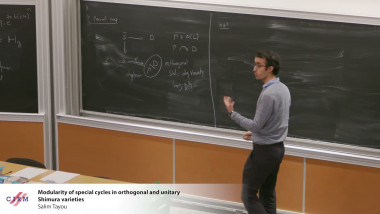
Nonlinear Landau levels (NLLs) in the almost-bosonic anyon gas
De Douglas Lundholm

Modularity of special cycles in orthogonal and unitary Shimura varieties
De Salim Tayou
Apparaît dans la collection : Toposes Online
Quantum mechanics implies a fundamentally non-classical picture of the physical world. This non-classicality is expressed in it sharpest form in the phenomena of non-locality and contextuality, articulated in the Bell and Kochen-Specker theorems. Apart from the foundational significance of these ideas, they play a central role in the emerging field of quantum computing and information processing, where these non-classical features of quantum mechanics are used to obtain quantum advantage over classical computational models. The mathematical structure of contextuality, with non-locality as a special case, is fundamentally sheaf-theoretic. The non-existence of classical explanations for quantum phenomena corresponds precisely to the non-existence of certain global sections. This leads to both logical and topological descriptions of these phenomena, very much in the spirit of topos theory. This allows the standard constructions which witness these results, such as Kochen-Specker paradoxes, the GHZ construction, Hardy paradoxes, etc., to be visualised as discrete bundles. The non-classicality appears as a logical twisting of these bundles, related to classical logical paradoxes, and witnessed by the non-vanishing of cohomological sheaf invariants. In this setting, a general account can be given of Bell inequalities in terms of logical consistency conditions. A notion of simulation between different experimental situations yields a category of empirical models, which can be used to classify the expressive power of contextuality as a resource. Both quantitative and qualitative, and discrete and continuous features arise naturally.
